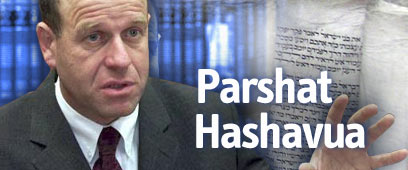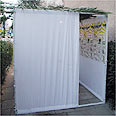

A Sukkah - reminds us of the temporary nature of success
Photo: Gabi Menashe
Parshat Haazinu, this week’s humble Torah portion, may be the grandest, most lyrical, and most beautiful of all portions. A small number of verses contain one of the most exalted Jewish biblical songs. Give ear, O ye heavens, and I will speak; and hear, O earth, the words of my mouth.
Moses places before him his eternal witnesses, the sky and the earth, and before them testifies to the Jewish people’s past and future. This is a song that summarizes his life’s work.
This time, it is devoid of fury or bitterness. Only an overview that amazes us with its breadth, altitude, and scope. Starting from the first day and up until after our last day.
One of the greatest Jews of the eighteenth century, Moshe Mendelssohn, views this song as everything. The prophecy of destructions and future redemptions, all of the pains and hopes.
And still, this portion is hidden between the powerful grandeur of Yom Kippur, which ended Thursday, and Sukkot, which is set to come in two days time.
The Jewish year began only two weeks ago. The Jewish month of Tishrei is jam-packed with holidays and events, at times making the purpose and object of each and every holiday unclear.
Maybe now is the time to create a semblance of order in the holidays, although this is not the place to get into the thick of things and decipher the Jewish conception of time.
We’ll make do with what is almost patently obvious: This is not about linear time. That is, a time that began at some point a long time ago and since then has progressed in a straight line from the past to the future, without stopping or turning back.
It is more likely that the Jewish perception of time is premised on cyclical fundamentals. That which has been is that which will be.
And how is a circle drawn? Using a pair of compasses of course. Curiously, it seems the Hebrew word for holiday (Chag) is rooted in the Hebrew word for a pair of compasses (Mechoga.) From this follows that every stop or event along the circle of time originated in the pair of compasses, thus receiving its name - chag.
A day of forgiveness and mercy
The first holiday was Rosh Hashana, the first and foremost day of the year. It was mainly used to mark the Jewish people’s universal responsibility for the whole of creation and over all residents of the world.
Ten days later comes Yom Kippur, which is wholly different in its character and essence. It’s a holiday of repentance and spiritual renewal. A day of dialogue between the believers and their God, a day of forgiveness and mercy.
On this day one cannot appear before God unless he or she first cleared the table filled with distortion and sins pertaining to us and the sea of humanity surrounding us. After all, Yom Kippur does not serve to repent the sins between one man and his friend unless the friend was placated first.
In other words, the main principle in the relationship between the believer and his God is the proper social system between the worshipper and the people around him. Without the human system below, there is no chance for a just, merciful attitude from above.
And Sukkot? How does it fit into the picture? This is the most social of the holidays. Originally, it was the holiday marking the end of the farming season.
This we must recall: The ancient Israelite society was not a high-tech society, neither an industrial society nor one of flourishing stock markets and businesses. It was a mostly agricultural society, and therefore, its symbols, imagery, and values are drawn from the earth and entrenched deep within it.
Now, at the end of the season, with the picking behind us, the fruits have been collected and the granaries are filled, a deep sense of satiation and self-satisfaction is taking root.
I did it, the farmer says to himself, I succeeded. I secured my finances and ensured my livelihood for another season, another harsh Israeli winter.
Learn to be kind and sensitive to those around you
Now of all times, when a man counts on his strength, Judaism orders him to celebrate Sukkot differently. Even if God forgave you and came up with a favorable verdict for Rosh Hashana and Yom Kippur, do not feel too good and comfortable with your fictitious tranquility and your home-fort-warehouse-treasure.
Give up your regular residence in favor of a temporary one, leaving the house of stone which provides a roof over your head and heading to the fragile Sukkah. Spend nights within its perforated walls and punctured overhead matting for a whole week. Just like a homeless person.
Give some thought to the temporal, and possibly coincidental, nature of your financial success. And once you internalize the temporary nature of your wellbeing, and realize that tomorrow you may, God forbid, again become poor as we were when the Jews left Egypt, you will also learn to be kind and sensitive to those around you. All those who did not achieve the financial success and stability you did.
Sukkot is the holiday where you deliver on the pledge you made before God when you asked for forgiveness. You promised to be better, more sensitive, more humane, and more helpful to those who have less than you. Otherwise, your sins would not have been repented in Yom Kippur.
The biblical song of “Haazinu” marks the shift between the fears before the Yom Kippur verdict to the educational transience of Sukkot. A song whose words live for eternity. Remember the days of old, consider the years of many generations.
The holidays are the days of old, and their above-mentioned substance marks the wisdom and substance that turned us from just another people to the people of eternity.















